2025 Physician Sentiment Survey: Priorities and pressures shaping job satisfaction
November 24, 2025
Physician engagement and retention remain critical priorities for health systems striving to balance financial pressures with the need to protect their most vital resource: physician talent.
To better understand what drives satisfaction and identify where key gaps persist, CHG Healthcare partnered with Hanover Research to conduct the 2025 Physician Sentiment Survey. More than 900 practicing physicians across the U.S. shared their perspectives on workload, compensation, leadership, the economy, and technology. The findings provide insight into what physicians value most, where they feel supported, and where organizations can strengthen alignment and culture to ensure long-term engagement.
Here are five key takeaways from the survey that highlight both the opportunities and challenges shaping physicians’ experiences today.
Leadership trust deficit
Physicians expressed concerns about their executive leadership, often citing insufficient support and a lack of trust. While 72% want to have input into decisions that affect their daily work, fewer than half feel that feedback is meaningfully incorporated (44%) or that leadership actively seeks their input (40%).
Transparency is also lacking, with just 39% agreeing that senior leadership communicates openly about decision-making.
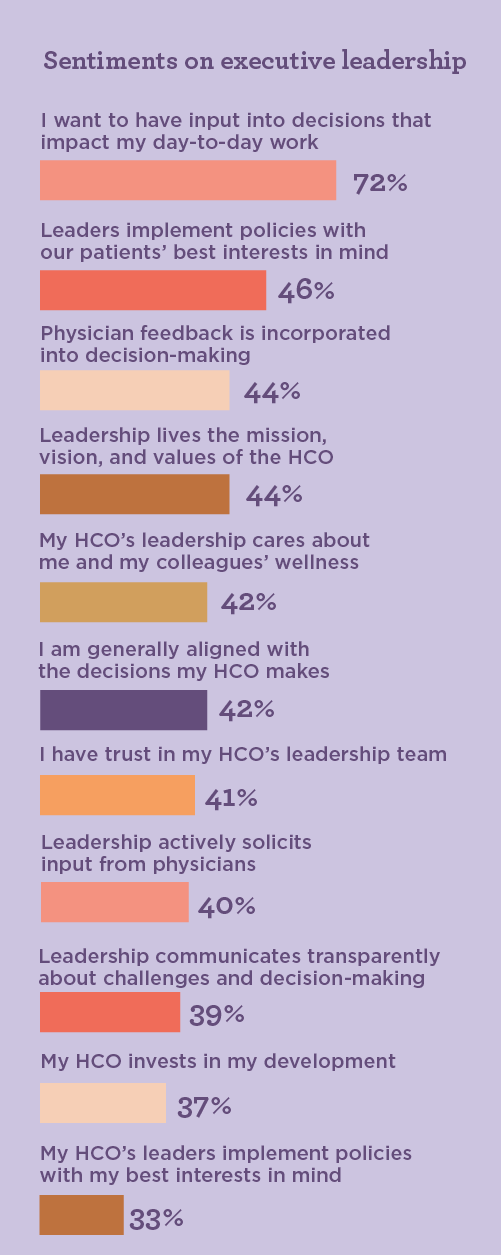
The disconnect extends to perceptions of care and support: Only 42% of physicians believe leadership prioritizes their or their colleagues’ wellness, and just one-third feel policies are implemented with their best interests in mind. Respondents pointed to compensation models, workload expectations, support staff hiring, and clinical protocols as areas where physician input could make the most significant difference.
Meaning in work, gaps in support
Physicians surveyed report high levels of satisfaction and engagement in their day-to-day work, yet systemic challenges within healthcare organizations often limit their overall sense of fulfillment. On the surface, the majority of respondents are positive about their current roles: 75% feel engaged in their day-to-day work, and 73% take pride in being part of their care team. These findings suggest that physicians remain committed to patient care and find meaning in their direct clinical responsibilities.
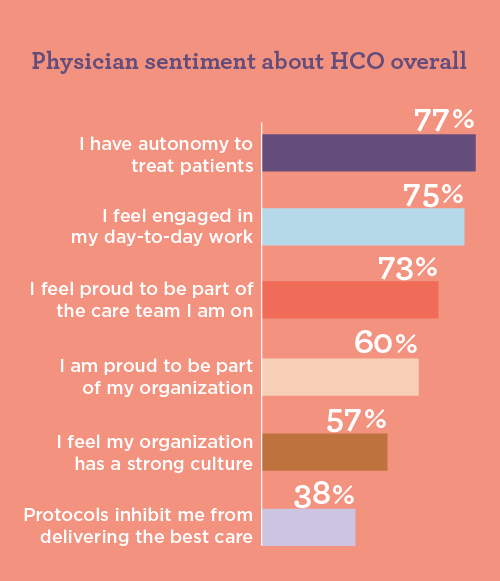
However, the data also reveals a sharp contrast between pride in their immediate work environment and sentiment toward their larger organizations. While physicians value their teams, only 60% say they are proud of their healthcare organization, and just 57% feel their employer has a strong culture. Nearly two in five report that organizational protocols prevent them from delivering the best care possible. These results underscore a growing tension: physicians feel deeply connected to their patients and colleagues but often disconnected from the systems in which they practice.
Key areas of unmet need are driving this disconnect. Respect for physician autonomy, compensation, and work-life balance were consistently ranked as the most critical aspects of workplace satisfaction. Yet, the survey revealed a significant gap between the importance and actual fulfillment of each of these drivers. For example, 91% of physicians say autonomy is very or extremely important, but only 59% are satisfied with the level of autonomy they experience. Compensation (87% vs. 53%) and work-life balance (86% vs. 59%) show a similar gap. These misalignments highlight where organizations must focus to not only retain talent but also foster physician well-being and long-term loyalty.
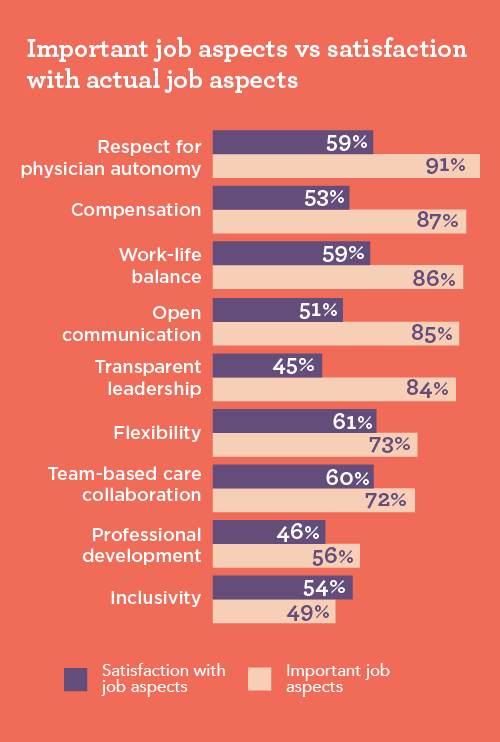
Economic strains add to stress
Economic uncertainty is amplifying the pressures physicians already face in their work. Nearly half (45%) reported a high degree of concern about the economy’s impact on their career or future, and 64% said they are more concerned about the economic climate now than one year ago.
In response, many physicians are exploring ways to supplement their income, including locum tenens work. Hospitalist Dr. Fuat Bicer turned to locums due, in part, to the financial benefit. During the period between his fellowship and full-time position, he worked locums to help meet his financial goals.

With debt and a mortgage, I needed funding during this transition. It was such good earnings for me in a short period that I asked myself, ‘Why am I starting a full-time job right away?' Having these earnings after my fellowship was amazing.
According to the survey, 15% of physicians not currently working locums say they would consider it, while among physicians already practicing locums, half report they are likely to increase their days due to economic pressures.
Take care of your physicians: 5 strategies for improving physician well-being
Workload, pay, and administrative burden
Compensation pressures, heavy workloads, and mounting administrative tasks continue to weigh heavily on physicians. Half of those surveyed said they spend too much time on documentation, and another third pointed to administrative responsibilities and high workloads as persistent challenges. These demands not only add to day-to-day stress but also take time away from direct patient care, where physicians feel the greatest sense of purpose and impact.
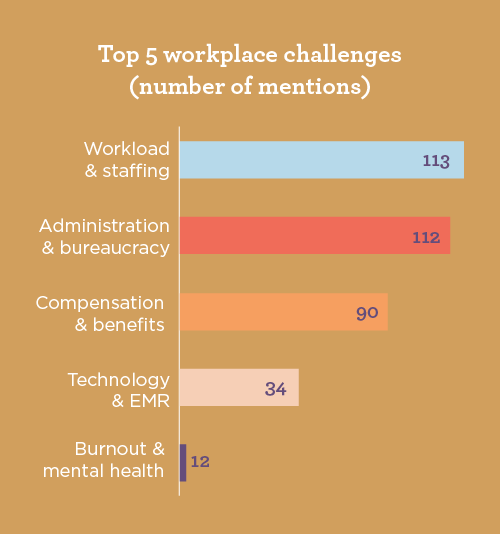
When asked to identify their top workplace challenges, physicians most often cited workload and staffing (113 mentions), administration and bureaucracy (112 mentions), and compensation and benefits (90 mentions). These findings paint a clear picture: physicians are not only stretched thin by clinical and organizational demands but also frustrated by the disconnect between their workload and the resources available to support it.
For OB-GYN Dr. Gina Bell, a shift to locum tenens helped alleviate the heavy administrative burden she was experiencing in her permanent position.

Not having to be a part of the bureaucratic issues is a huge plus. With locums, I’m able to just focus on patient care.
What's the motivation? Why physicians choose locums
Digital potential, limited input
Physicians see strong potential in digital tools, including AI, to benefit work-related tasks, but adoption remains limited compared to the benefits they envision. Currently, 40% report using digital technology for administrative work, although 84% believe it could be more widely beneficial in that area. Similarly, only 28% are using digital tools for diagnostics, while 79% believe broader adoption would add value. Nearly three-quarters also say AI and other digital technologies could positively impact productivity, underscoring a strong appetite for technology that can ease workloads and improve efficiency.
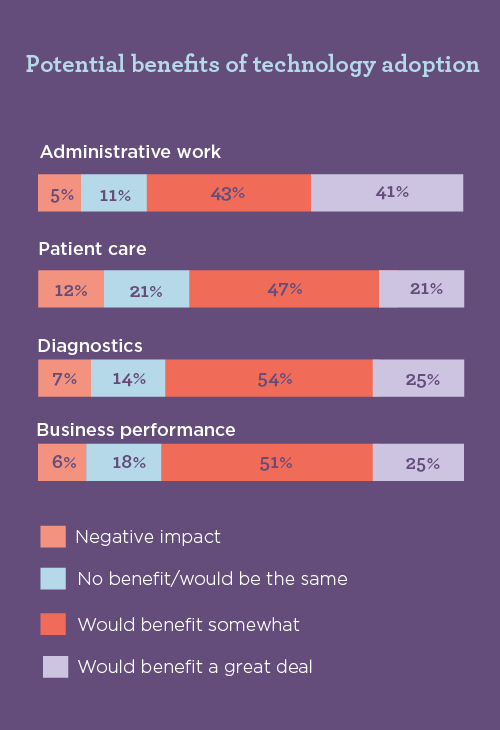
Despite this optimism, many physicians feel excluded from technology-related decision-making. While 71% want to be involved in their organization’s choices around technology adoption, only 30% report actually having input. This disconnect highlights an opportunity for healthcare organizations to engage physicians more directly in technology decisions—helping ensure that future digital solutions advance care and meaningfully support those delivering it.
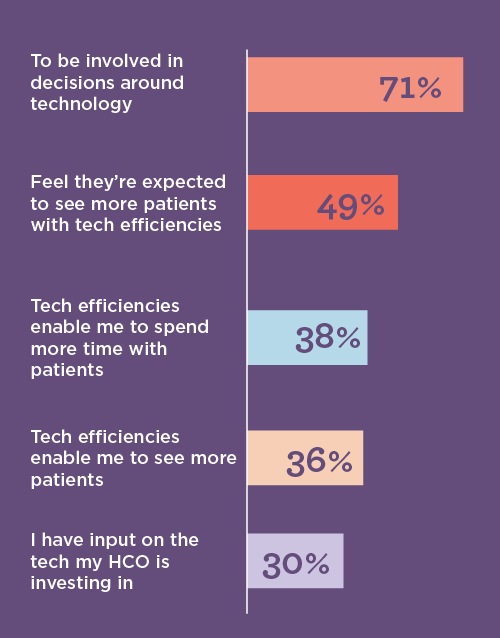
Charting a path forward
The 2025 Physician Sentiment Survey findings underscore that while physicians remain deeply committed to their patients and teams, gaps persist, and there is an increasing need for better workload management, fair pay, tech adoption, and stronger leadership support. Addressing these gaps is critical not only to improving physician satisfaction but also to sustaining a strong, resilient healthcare system.
Read the full Physician Sentiment Survey report on the CHG Healthcare blog: